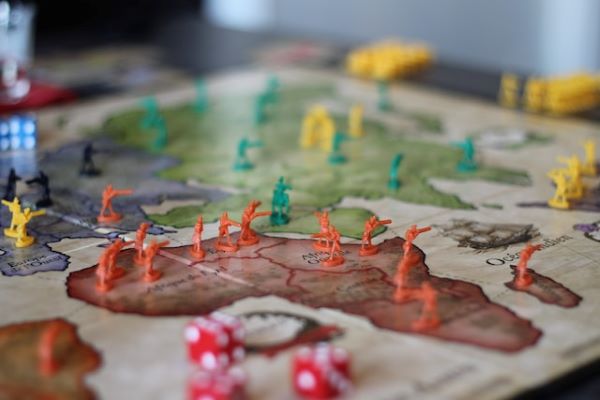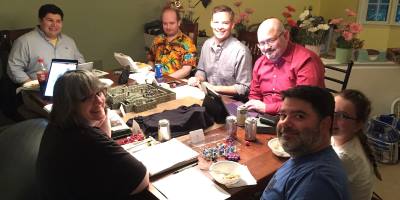For those of us who play, we know Dungeons and Dragons (D&D) as an exciting and immersive experience. However, I believe it is also a valuable tool for developing critical skills applicable to the business world. In todays post, I explore how engaging in the world of D&D (and other games like it) can help professionals learn to assess risk effectively. I delve into the concepts of uncertainty, decision-making, strategic planning, adaptability, and learning from failure, showcasing their direct application in the business environment.
Uncertainty in the Realm of Adventure
D&D is a game filled with uncertainties. Players constantly face unknown challenges and unpredictable outcomes. Goals can sometimes get blurred and allies turn out to be villains in disguise. Perhaps the helpless prince is actually the evil mage in disguise. Not only that but adventures are often full of hazards, traps, puzzles and antagonists. This unknown is what makes the game fun. Facing off against unpredictability and then pulling through as a team creates a shared sense of accomplishment that is difficult to replicate elsewhere.
Similarly, the business world is rife with uncertainties, ranging from market fluctuations to changing customer demands. By its very nature the world is chaotic. Good leaders need to be able to calmly navigate these waters of unpredictability.
By regularly facing uncertainties in the game, players can learn to embrace ambiguity, developing a resilient mindset essential for assessing risk in the business world.
Decision-Making and Consequence Evaluation
In D&D, players make decisions that have lasting consequences. Each choice carries a level of risk, and players must evaluate the potential outcomes before committing. If the DM is doing their job right, choices should be made under tight time pressure and with limited information. Of course, the consequences should also be significant.
This mirrors the decision-making process in the business world. I would argue, that most decisions made by a leader have limited information and degrees of time pressure. Whether a team needs an answer now to keep their project moving, or a customer is requesting a new service, there is never enough information and action must be taken.
Jocko Willink author of Extreme Ownership suggests making small iterative decisions to counter this lack of information. This allows you to easily adjust as new information comes to light. While I do use this technique as part of my real world job I have also found myself purposefully practicing it when I play role playing games. As such it is now second nature and a regular part of the way I operate as a leader.
Once again, by playing the game, players gain experience in weighing risks, analyzing potential outcomes, and considering long-term consequences. Invaluable skills for risk assessment and decision-making in business.

Strategic Planning and Resource Management
Undertaking D&D adventures often require strategic planning and resource allocation by the players. Players assess the risks associated with different paths, balance resources, and adapt their strategies accordingly. For example, exploring a lost underground city might require climbing tools, torches and a map. Whilst removing an evil vampire lord may require magical weapons and a plan centered around sunlight.
Of course, these skills directly translate to the business world. Strategic planning and resource management are essential for mitigating risks, seizing opportunities, and maximizing returns on investments. Again each business is different requiring a unique strategy. The resource planning for an environmental consultancy would be very different to a manufacturer of water quality instruments. But the concepts and principles remain the same. People, customers, finances and systems & processes all need to be considered.
Adaptability in Dynamic Environments
Dungeons and Dragons is known for having a dynamic and ever-changing nature. Players and Dungeon Masters alike, adapt to unexpected challenges, revise strategies on the fly, and pivot when necessary. The story evolves through player action and often ends up in places that no one expected. I believe this is where the gold of the game can be found, in this dynamic, improvised area where the story can take on a shape of it’s own. For the magic to happen all the players have to be able to adapt to these in game shifts and take joy in the unexpected.
Similarly, business is characterized by constant change and disruptive forces. There have been an incredible number of disruptions over the last decade with companies scrambling to adapt and keep up. AI, autonomous vehicles, Internet of Things are a few of the high profile ones. As a leader you have to get comfortable with this change and uncertainty. Embracing and finding joy the ever-changing nature of the world will set you up for opportunity rather than defeat.
By honing adaptability skills in D&D, players cultivate the ability to assess risks in real-time, make agile decisions, and adjust business strategies to navigate uncertain environments successfully. It can help you get comfortable with change and find joy in dynamic outcomes. A critical mindset to find in todays fast changing business landscapes.
Learning from Failure and Iterative Improvement
Failure is a natural part of D&D, where players may encounter setbacks, make mistakes, or face defeat. However, these failures serve as valuable learning opportunities. Through reflection and analysis, players can identify the factors that contributed to their failures and develop strategies to improve their future outcomes. This mindset of learning from failure and embracing iterative improvement is essential in the business world, where risk assessment requires an open mind, adaptability, and a continuous learning mindset.
Final Thoughts on D&D and Risk
I believe playing Dungeons and Dragons provides a unique and immersive experience that helps individuals develop essential skills for assessing risk in business. By navigating uncertainties, honing decision-making abilities, strategic planning, embracing adaptability, and learning from failure, D&D players acquire a valuable toolkit to assess and manage risk effectively. The transferable skills developed through the game empower individuals to make informed decisions, seize opportunities, and navigate the complexities of the business landscape with confidence.
Next time you play D&D, take a moment to think about the risks you encounter and how you plan to face them.



